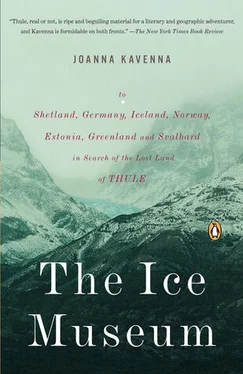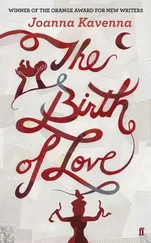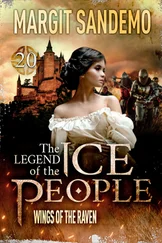His name was Douglas, and he had worked in a fishing institute for years. His mother had met his father here during World War Two, he said. His father had come from occupied Norway on a boat.
‘It was called the Shetland Bus,’ he said. ‘The resistance in Norway arranged for people to sail their small boats over. If they were caught by the Germans they were killed or imprisoned. My father—he came from a small fishing village, north of Bergen on the western coast of Norway—he couldn’t stand living under the Germans. He was a fine man. His name was Olav, like the kings of Norway, you know. So he set off with his brother in a boat—they were terrified. They were stuck in storms and they thought the boat would go under. But they arrived in a port further north from here, on the island of Unst. Their boat couldn’t take them further, so they just settled where they landed. The people welcomed them, glad to help. My father always talked about how grateful he had been, that the people were so kind. And my father got some work with my mother’s father. He didn’t know her then, of course. He said the first day he was there, he was working away in the yard, trying to fix some piece of machinery, and this woman appeared—she was the most beautiful thing he’d ever seen. But he was shy, quite young of course, and didn’t want to bother the boss’s daughter. He thought he’d lose his job, and then what would he do? Straight back to Norway and to the Nazis, and after all that rocking around in the sea, it would have been a terrible thing. So he did nothing. He just worked hard every day, and every time he saw her he said he almost dropped the hammer, or whatever he was using, she was so beautiful.’
‘It has a happy ending,’ said the barman, who was listening. ‘Don’t you worry yourself, it’s a great ending.’
Douglas smiled, gripping his pint between rough fingers. ‘The ending is me and my sister and brother. So you could say it’s happy. Finally, my poor dad plucked up the courage. You can imagine the lad, speaking with his Norwegian accent, trying to ask her if she would marry him. He thought that was the best thing to try. Everything or nothing. Turned out she was in love with him. Had loved him the moment she saw him. He stayed on Shetland for the rest of his life. They were always happy.’
And Doug smiled again, swilling his whisky round his glass. ‘Something in the peat,’ said another man at the bar.
Later, I drifted out of the conversation at the bar, as a group listed the Top Ten Drunks of Thule, and I thought how the Romans had taken the elements as their evidence. The briny sea, the resistant waves convinced the Romans they had found Thule when they arrived in Britain. It was all tenuous. I sat in Lerwick, with the wind wailing outside and the mist swirling at the windows. A more self-effacing collection of people was impossible to imagine; the regulars at the bar hardly laid claim to the place at all. A couple of guide books ran the story out, mumbling briefly about the Romans, before sliding into something else entirely, but that was it for Shetland-Thule. A collection of cautious locals, a bar and a knitwear shop. A ragged, empty place, with its crusted peat bogs and bright green islands. It was affecting and slightly strange. Strange to find this outpost at the edge of Britain. Strange to find it so littered with ancient stones, ancient houses, all alluding faintly to the past.
In Shetland, I drove up and down the islands, sitting on car ferries as the evening fell, crunching the gears on the coastal paths. Green hills slipped away in the rear-view mirror. Most of the time I was alone on the coasts, at the peat ruins and the brochs. But there was a ragged collection of Viking stones, called Jarlshof, in the south of Shetland, where the car park was full of buses and German and Norwegian tourists queued at a ticket office. Jarlshof was a composite site, the accumulated ruins from thousands of years of habitation on the island, and a shattered house on a cliff, left by the Stewart earls of Orkney and Shetland, abandoned since the seventeenth century. Sir Walter Scott, who found the hills of Shetland a perfect retreat, had given Jarlshof its name. Scott thought the cragged castles, derelict stone lashed by waves, made for a romantic backdrop, though all he saw were the surface ruins, the storm-smashed house on the cliff. He knew nothing about the middens, piled with leftovers from earlier settlements. It was only in the last century that the surging of the storm waters revealed stone walls, and the layers of ancient foundations.
I stood on a viewing rostrum above Jarlshof as the wind screamed across the bay. The ruins looked like a stunted maze, every crumbling wall grown over with grass and moss. I walked around the site, deafened by the gale. The tour groups sheltered from the wind in the round-house ruins, listening to German guides. Jarlshof was a vast and significant pile of ruins—the broken foundations of Norse settlements, the stone walls of a Pictish farmhouse, the outhouses and barns. There had been bone pins, clay bowls, steatite pots, iron sickles, fishhooks and iron scissors, dropped in the earth. The earliest settlers collected cockles, mussels and limpets, and kept a few sheep, cattle and pigs. They built a cluster of oval stone houses among the sand dunes, and they caught fish and hunted seals. Surrounded by other buildings stood the half-eroded shape of a broch, built of smooth stone slabs.
There were people who had wanted Thule for Shetland, Scottish patriots some of them, Albion-worshippers some of the others, casting Thule in the national drama. I had the quotations running through my head, as I stared at the shattered ruins, under a pearl-white sky. They chimed in, with their stanzas, their sonnets, their odes to the monarchs of Albion and Thule. Scotland and Thule were entwined, in rhetorical couplets, for the sake of a decent rhyme, for a rousing chorus. In “The Seasons,” James Thomson described the ‘utmost isles’ of Thule, somewhere off the coast of Scotland. Eighteenth-century wig-maker, bookseller and poet Allan Ramsay made a rousing cry to ‘Britain’s best blood,’ all those living ‘From utmost Thule to the Dover rock,’ the limits of Britain. In another poem, he imagined John Gay praised ‘frae Dover Cliffs . . . to Thule’s shore,/Where Northward no more Britain’s found/But seas that rore.’ Nineteenth-century Scottish poet and physician David Macbeth Moir wrote about the Battle of Flodden Field, mourning the ‘nameless dead,’ imagining the laments sounding from ‘northern Thule to the Tweed.’ It was a floral way of saying from north to south, making the phrase as epic as he could. At the end of Scotland, they wrote, Thule lay, the last land of the Romans, a place with an epic past.
In the nineteenth century this sense of an ancient outpost enticed the Victorians, though they were unsure of Shetland’s claim to the title of Thule. They commandeered boats and sailed out to brochs lashed by waves. They darted around the peat hills near Lerwick, staring across the cliffs towards the ruined castles and the small ports. They found a museum full of old pots, picked them up with a brisk air, and made a few notes in their diaries. For William Morris, Shetland was the beginning of the remote north. Shetland was where the sea became a great ‘glittering green and white wall,’ where the ships first met the ‘roll of the Atlantic,’ he wrote. For Burton, it was a place where the people changed colour; ‘the blondes,’ he wrote, ‘wear that faded and colourless aspect which especially distinguishes the Slavic race. The look is shy and reserved, and the voice is almost a whisper, as if the speaker were continually nervous. ’ The muddiness of their complexions, he thought, derived from all the peat water they drank.
Читать дальше












